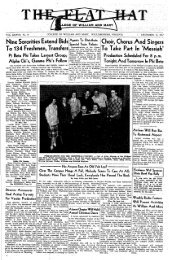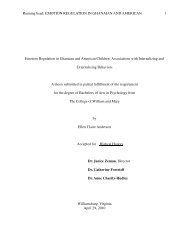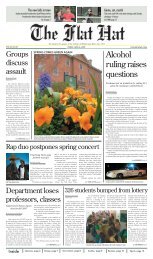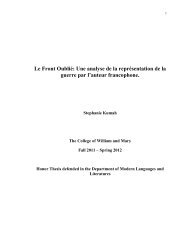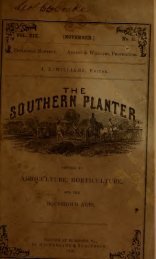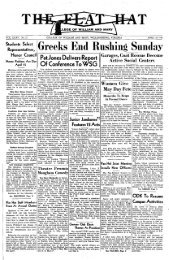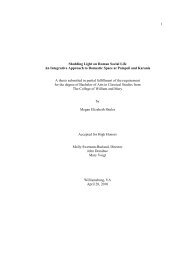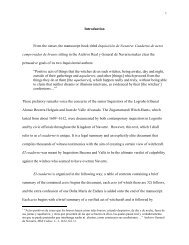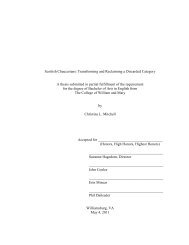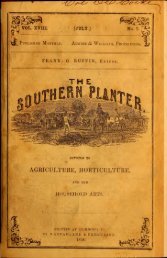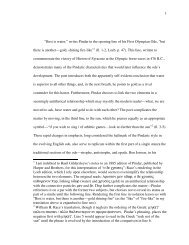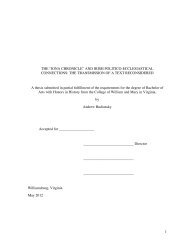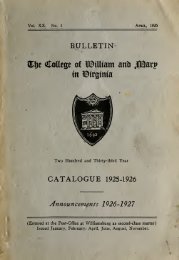Southern planter - The W&M Digital Archive
Southern planter - The W&M Digital Archive
Southern planter - The W&M Digital Archive
You also want an ePaper? Increase the reach of your titles
YUMPU automatically turns print PDFs into web optimized ePapers that Google loves.
1859.] THE SOUTHERN PLANTER. 387<br />
tcrnally to its susceptibilities, I would sac-<br />
rifice a little of the u over-joyful" to see ;;<br />
drunken plant. He also informs me that<br />
brandy is not a "mere stimulant" to animals,<br />
though it be the type of the class of " mere<br />
stimulants," from which I infer, he means,<br />
that while plants arc susceptible to the ac-<br />
tion of u more stimulants," animals are<br />
not. How is it with hope, and joy, and<br />
anger ? Are they fattening also ? Rut I<br />
hate to give up the brandy ; and I know<br />
that u B." has the good taste to like it,<br />
too,—for lie says that u it is destruction to<br />
rose bushes, but as fattening as Cod-liver to<br />
man," which we in all our admiration must<br />
doubt ; and we will hazard our opinion<br />
that, if "B." will go it on brandy alone<br />
for one month his " fair, round belly<br />
and good caponed loin" will vanish into<br />
the lean and lank Cassius form.<br />
Again he asks, * How does the gentleman<br />
know that all the positive phenomena<br />
of such action (stimulant) are found in<br />
connection with such a known system of<br />
nerves." Because I have never known the<br />
application of any stimulant to anything<br />
without nerves to produce phenomena in<br />
accordance with the functions of a nervous<br />
apparatus, and the manifestations of the<br />
functions of a nervous apparatus are what<br />
I call " the positive phenomena."<br />
" B." quotes from a u learned and dis-<br />
tinguished physiologist in vegetables" the<br />
following remarkable enunciation of facts ;<br />
but however learned and distinguished his<br />
authority may be, he must excuse us for<br />
asking for the proof. An " ipse dixit,"<br />
is one mode of imparting knowledge and a<br />
quod erat demonstrandum" is another.<br />
And where propositions are new and start-<br />
ling, we of little faith require the latter :<br />
" Two properties direct the action of<br />
their small number of functions j a latent<br />
and faint sensibility, in virtue of wnich,<br />
each vessel, every part of the plant is affected<br />
in its own way by the fluids with<br />
which it is in contact,—a contactility as<br />
little apparent, though the results prove L-<br />
refragibly its existence; a contactility<br />
in virtue of which the vessels sensible to<br />
the impression of liquids close or dilate<br />
themselves to effect their transmission or<br />
elaboration. <strong>The</strong> organs allotted to reproduction<br />
animate, for a moment, this exhibition<br />
; more sensible, more irritable, they<br />
are visibly in action j the stamina, or male<br />
organs bow themselves over the female<br />
organs, tiie pistil shakes on the stigma the<br />
fertilizing dust, then straightens, retires<br />
from it, and dies with the flower, which is<br />
succeeded by the seed or fruit."<br />
So you perceive the learned and distinguished<br />
physiologist has not only discovered<br />
" a latent and faint sensibility," but also<br />
the highest attributes of animal life, consciousness<br />
and volition. We can but think<br />
that the learned gentleman left the province<br />
of philosophical research for that of fancy.<br />
M B." refers, very properly, the agency<br />
of heat, in producing such sublime phenomena<br />
in the mineral kingdom, to its expansive<br />
powers ; but supposes it possesses<br />
another and distinct power when applied to<br />
the vegetable and animal kingdoms. He<br />
says, ** the potency here excited is an exalting,<br />
quickening, life-giving energy." So<br />
it is; but how does «it do it? We apprehend,<br />
(if he will permit the expression,)<br />
by the agency of the same expansive<br />
power elaborating the elements of nutrition<br />
out of pre-existing compounds, and<br />
when these elements are brought within<br />
reach of the assimilating power of vegetables,<br />
they produce " an exalting, quickening,<br />
life-giving energy."<br />
Heat has but one force and one power,<br />
and that is manifested alike upon all Oodles<br />
and all matter. It is a great disengaging<br />
force tending to separate particles of mat-<br />
ter, and its antagonistic force is " affinity."<br />
Yet it is frequently employed to aid the<br />
power of affinity, by presenting matter in<br />
a more eligible condition.<br />
We acknowledge the receipt of the<br />
" autograph," and must confess to no little<br />
anxiety to meet in person the individual<br />
(on many accounts) that owns so remarka-<br />
ble a cognomen, and am not surprized that<br />
he hesitates to give it to the public. For,<br />
were it " Scroggins," it would not be less<br />
euphoneous than the veritable " autograph."<br />
W. A. BRADFORD.<br />
Clarke Co., June 8th, 1859.<br />
«»•»><br />
Sex of Eggs.<br />
A correspondent of an English paper affirms<br />
that he learned whilst in France,<br />
among the best poultry breeders, that the<br />
long narrow eggs were set aside as male eggs,<br />
or those that would produce male chickens if<br />
hatched out, and that the round dumpy ones<br />
would produce female chickens.



